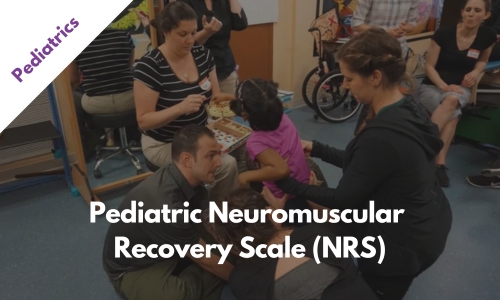Quantifying recovery after spinal cord injury (SCI) and other neurologic disorders in the clinic is a challenge, yet a timely need with advances in therapies targeting enhanced recovery post-SCI. While some measurement instruments specifically designed for SCI rehabilitation typically allow compensation, other measures such as manual muscle testing prohibit use of compensatory strategies during testing. The Neuromuscular Recovery Scale is innovative and unique in that performance is assessed based on a comparison to pre-injury performance criteria or how a task was performed one day prior to SCI and without use of compensation strategies. For instance, the ability to stand up from sitting is assessed without use of load-bearing on the arms and with usual, pre-injury limb and trunk kinematics for this task as the reference for comparison.
The Pediatric Neuromuscular Recovery Scale is a new assessment scale that assesses a child’s (age 1-12 years) neuromuscular capacity to perform 13 everyday tasks without behavioral compensation, physical assistance, or assistive deviceA device that can assist the individual or caregiver when performing a functional task. For transfers and walking, this could include a single tip cane (STC), single point cane (SPC), rolling walker (RW), standard walker (SW), etc. More/orthotics. Thus, ‘how’ a task is performed is critical to the assessment and uniquely defines the tool compared to other pediatric assessment instruments. Ten tasks are assessed in a routine clinical setting and include supine-to-sit, sitting inside base-of-support, sitting outside base-of-support, object to mouth, in-hand manipulation, overhead reach, sit-to-stand, standing (static/dynamic), and walking; while three tasks are assessed on the treadmill to examine standing and stepping capacity in a controlled environment (e.g. body weight support, treadmill speed).
The Peds NRS was introduced at the SoPac 2015 conference in Pittsburgh and the first paper describing the scale will be published in Pediatric Physical Therapy by E. Ardolino. The scale was adapted from the Adult Neuromuscular Recovery Scale developed to examine recovery in adults with SCI with established validity, reliability, and responsiveness (Behrman et al. 2012, Basso et al. 2014, Behrman et al. 2015, Velozo et al. 2015, Tester et al. 2015). The Peds NRS was adapted and developed specifically for children with neurologic disorders with funding from the Craig H. Neilsen Foundation (Andrea Behrman: PI; co-investigators: MJ Mulcahey, Elizabeth Ardolino; Research Physical Therapists: S Trimble, L Argetsinger, M Bienkowski, and C Mullen). Pediatric PTs, OTs, and physicians contributed to the content-development and validation of the instrument.
This course introduces the Pediatric Neuromuscular Recovery Scale, its items, and scoring method through a detailed manual of procedures and example videos of therapists conducting the Peds NRS with typically-developing children. The on-line course culminates with the participant viewing videotapes of patients (i.e. children with neurologic disorders) undergoing the Peds NRS evaluation and then practice scoring each item. Scoring outcomes are reviewed with detailed explanations. This initial on-line course must be fully completed prior to enrolling in the Pediatric NRS competency course.
Students who complete both the Pediatric Neuromuscular Recovery Scale and the competency, are eligible to receive the Peds NRS certification, either ‘over ground’ items alone or all 13 items (includes the treadmill items). Treadmill-based items require specific equipment and advanced manual skills for facilitating stepping/standing. Therapists having this skill set may select to seek certification for all 13 items. Certification entails 1) completion of the on-line course, 2) achievement of scoring reliability of the Peds NRS (on-line videos), and 3) submission of a video of the therapist conducting the scale (10 or 13 items) on a typically-developing child. Submission of the video is anticipated after completion of the competency. The manual for conducting and scoring the Peds NRS identifies key elements of the assessment for competency and standardization in conducting the assessment. The manual and a parallel checklist will be used to evaluate the competency for conducting the Peds NRS (video submission). Establishing competency is useful for therapists or staff working in clinical and research settings to establish consistent, standardized use of the Peds NRS within and across clinicians/raters for clinic or research purposes.

